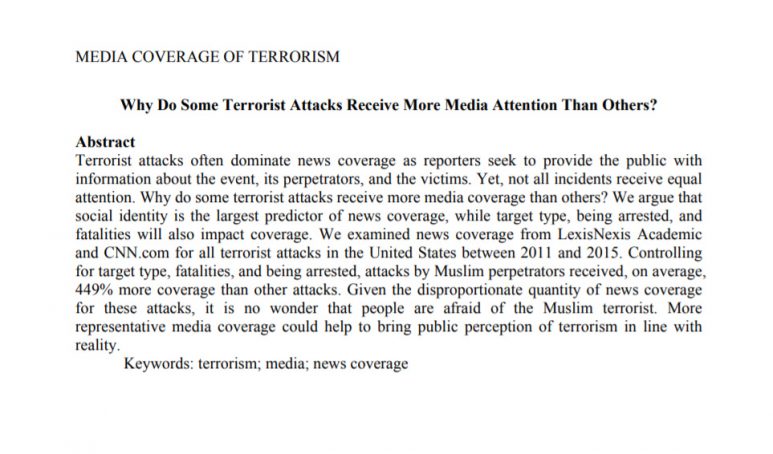Research completed by the University of Alabama found that terror attacks by Muslims receive 357% more press attention that those by non-Muslims. Analysing coverage of terrorist attacks in the US media between 2006 and 2015, the researchers concluded that terror attacks committed by Muslims receive significantly more media attention. Specifically, they receive an average of 105 headlines, whilst terrorist attacks committed by non-Muslims only receive and average of 15.
“Myriad factors may impact why a particular terrorist attack receives more coverage than another. By modeling coverage over all terrorist attacks in the United States during a ten-year period, we are able to identify trends in coverage. As we see here, perpetrator religion matters for the quantity of coverage that an attack receives. We found clear evidence that terrorist attacks perpetrated by Muslims receive drastically more media coverage than attacks by non-Muslims.”
The research conclusion is clear: the media is heavily skewed towards Muslim-related terrorism:

“When people think about terrorism, events like the Boston Marathon bombing and the Fort Hood shootingare what come to mind. This is not surprising considering that these two incidents received over a quarter of the coverage in the U.S. over the last decade. Yet, so much is missed.
Based on fatalities, there are a few attacks in the dataset that received less coverage than we would expect. Wade Michael Page’s attack on the Sikh Temple in Wisconsin killed 6 people and it only received 2.6% of the total coverage. Frazier Glenn Miller’s attack on a synagogue in Kansas killed 3 people and it only received 2.2% of the coverage. Dylann Roof killed 9 people in an African American church in Charleston and received 5.1% of the coverage.
These attacks have two things in common: the perpetrator was a white man and the targets were both religious and minority groups. These instances highlight disparity in media coverage of terrorism.”
Why_Do_Some_Terrorist_Attacks_Receive_More_Media_Attention_Than_Others.pdf
Nenad Radoja
Contrary to popular belief, Lorem Ipsum is not simply random text. It has roots in a piece of classical Latin literature from 45 BC, making it over 2000 years old. Richard McClintock, a Latin professor at Hampden-Sydney College in Virginia, looked up one of the more obscure Latin words, consectetur, from a Lorem Ipsum passage, and going through the cites of the word in classical literature, discovered the undoubtable source.
